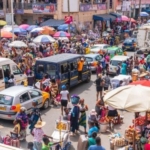
The Ghana Union of Traders’ Associations (GUTA) is warning that the government’s new Value Added Tax (VAT) reforms will hit small and medium enterprises hard and distort competition across the country’s markets.
The Association says the sudden shift from the 4% flat rate to a 20% VAT for many traders will be devastating.
In a statement issued on November 18, GUTA’s First Deputy Secretary General, Richard Amamoo, said the Union is observing “with grave concern” the challenges that will emerge from the new regime.
He said GUTA “acknowledge and welcomes measures aimed at enhancing tax compliance and improving revenue collection,” but stressed that the reforms come with serious unintended consequences.
Mr Amamoo said the new threshold of GH¢750,000 creates a market split that will “segregate” traders.
According to him, two traders dealing in the same products in the same market will now be treated differently. One will charge 20% VAT because their turnover crosses the threshold.
The other, with lower turnover, will charge nothing. GUTA fears customers will simply go to the trader without VAT, leaving the other at a huge disadvantage. The Union says this will “distort fair competition.”
GUTA also warned that traders who were previously on the 4% flat rate scheme will now be forced into the 20% VAT bracket.
Mr Amamoo said the daily turnover exemption of GHS 2,366 means any excess will push a trader into the standard regime. He said this will lead to “higher prices for consumers and loss of business for affected traders.”
He called on the government to allow traders to opt for a modified tax system that ensures parity. GUTA believes a fairer structure will promote compliance and reduce the risk of non-compliance fueled by pressure and imbalance.
Mr Amamoo also touched on the government’s planned introduction of Artificial Intelligence at the ports.
He said GUTA supports technology that improves efficiency, but insists that taxes at the port must first be rationalised “as promised” before AI systems are deployed.
GUTA says it remains committed to dialogue, but insists the reforms must not “harm the livelihood of Ghanaian traders.”